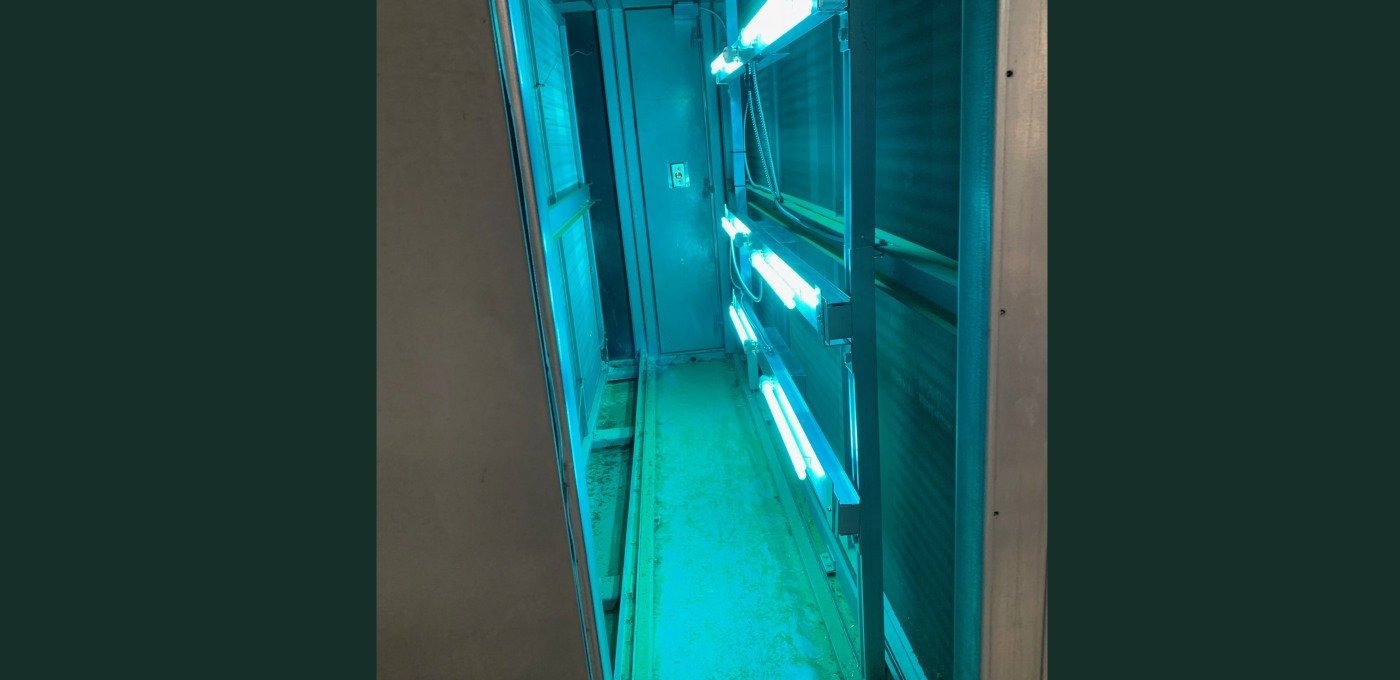
Herkimer College installs UVGI technology to protect students, staff from airborne pathogens

The College has also made upgrades to campus infrastructure with energy-efficient solutions.
In response to the COVID-19 pandemic, Herkimer County Community College has upgraded its infrastructure to ensure the health and wellness of students, employees, and campus visitors. The project included the installation of ultra-violet germicidal irradiation (UVGI) technology in the College’s heating, ventilation, and air conditioning (HVAC) system.
UVGI is a disinfection method that uses short-wavelength ultraviolet (ultraviolet C or UVC) light to kill or inactivate microorganisms by destroying nucleic acids and disrupting their DNA, leaving them unable to perform vital cellular functions.
Herkimer College contracted with Eastern Energy Solutions, Inc. (EES), an energy contracting and consulting firm focused on increasing profitability for clients by identifying and implementing Design-Build solutions that reduce operating costs, improve the working environment, and resolve power quality issues negatively affecting operational and production cost. EES has been working with UVGI technology since 2008, primarily in the hospital, dairy and laundry sectors.
According to EES President Bob Granger, UVGI has been around for more than 75 years and was primarily used in the healthcare industry where microbial disinfection is a major concern. With the recent pandemic, the use of UVGI is being implemented throughout market sectors and even in the home.
UVGI lighting systems are designed to provide air purification, reduced maintenance, and increased energy efficiency within the air handling units in which they are applied. As air passes through the UV-C light spectrum/wavelength, airborne infectious pathogens that can cause respiratory sickness, disease, and infection (including COVID-19) are rendered inert, in-turn providing high-level, facility-wide disinfection of the air supplied to occupied spaces.
“What Herkimer College has accomplished is outstanding. The upgrades they have made are delivering many real advantages to all on campus,” said Granger.
According to Nicholas Laino, senior vice president for administration and finance at Herkimer College, the nearly $100,000 investment in UVGI technology was 100 percent funded by federal Coronavirus Aid, Relief, and Economic Security (CARES) Act funds granted to Herkimer College. Laino said, “First and foremost, the health and wellness of our campus community is our top priority, and we are committed to maintaining a safe environment for our students, employees, and visitors.”
Added benefits to protecting the health and wellness of the campus community may include reduced absenteeism and increased employee and student performance.
Custom Lighting System installed in Pool Area
EES also recently implemented its custom-designed and fabricated lighting system in Herkimer College’s indoor swimming pool area. The College needed help in implementing a new lighting system that would be energy efficient, provide higher and more uniform light levels, and be able to utilize the existing electrical system. The new aesthetically pleasing lighting system is providing targeted light levels at an energy savings of 73 percent. In addition to saving on energy cost, the College also was able to receive a utility rebate.
“We are extremely pleased with the innovative ideas and superior work of EES. Recent investments made to update the campus infrastructure with energy-efficient solutions will have a long-term payback well-worth the initial investment, not to mention the added benefits to our community and the environment,” said Laino.
Commitment to Reducing Energy Usage
“Over the past many years, we have been very aware of our carbon footprint and have made many efforts to reduce energy usage and greenhouse gas emissions,” said Tom Stock, interim director of facilities at the College. According to Stock, about 80 percent of the campus lighting has been upgraded to LED lighting.
LED lamps are approximately 75 percent more efficient than incandescent bulbs and last 5-10 times longer. Typically, an LED will last four times longer than a CFL and 25 times longer than an incandescent source that puts out the same amount of light. Although the initial cost of conventional light sources is less than LEDs, the operational and maintenance costs of LED are significantly lower. LEDs, having a longer life, reduce maintenance and lamp replacement cost. LEDs also consume less energy; thus the overall cost of LED can be significantly lower than that of conventional lighting systems. According to EES, most applications with LEDs offer a payback period as low as one to four years. Herkimer’s transition to LED is estimated to save 801,870 kilowatt-hours annually. Emissions saved from this project are equivalent to 481 trees planted or 71 cars driven per year.
Herkimer College is currently working with National Grid on a street lighting conversion project along the roadway leading to campus. Although the College does not own the lights, it does pay a monthly fee to National Grid, and therefore an upgrade to LED would result in cost savings to the College. Additionally, the Herkimer County College Foundation, a not-for-profit corporation that owns the property on which the student housing is located, is planning a lighting upgrade on housing property.
“Herkimer College has done an excellent job at reducing their carbon footprint. Their commitment and long-term planning in regard to protecting their campus community, as well as the greater environment, and reducing costs through energy conservation serves as an excellent example for other organizations,” said Granger.

